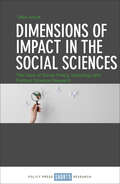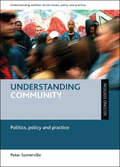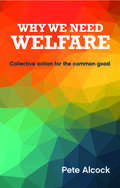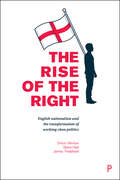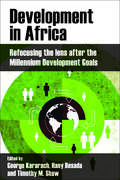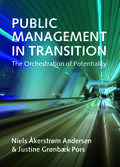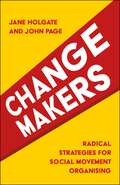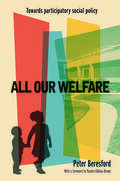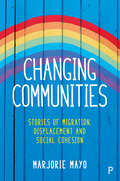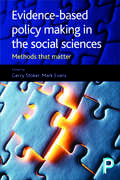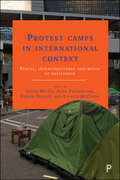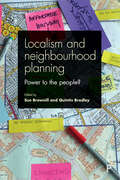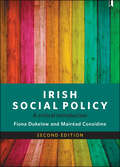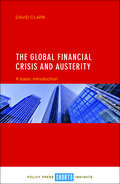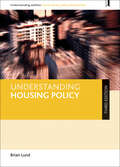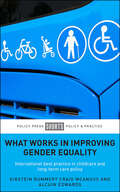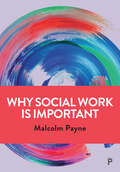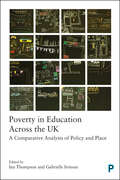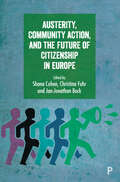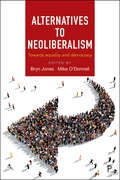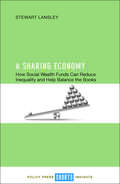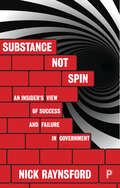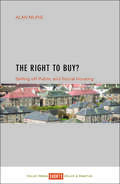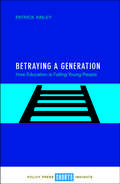- Table View
- List View
Dimensions of Impact in the Social Sciences: The Case of Social Policy, Sociology and Political Science Research (Studies in social harm)
by Tina HauxImpact has become a central part of the assessment criteria for academic worth. It has been adopted by many research funding bodies, and it is firmly embedded in the British Research Excellence Framework. However, a clear definition of impact remains elusive and guidance on how exactly to achieve it is often superficial. This concise, informative book analyses impact across the social sciences. It draws on the analysis of the most highly ranked British impact case studies from the 2014 Research Excellence Framework, as well as fifteen interviews with senior academics, providing a longitudinal and critical framing of impact. The author concludes with valuable recommendations of how and when scholars can achieve impact.
Understanding Community: Politics, Policy and Practice (Understanding Welfare: Social Issues, Policy and Practice)
by Peter SomervilleThis substantially revised edition of a highly topical text draws upon theory from Marx and Bourdieu to offer a clearer understanding of community in capitalist society. The book takes a more critical look at the literature on community, community development and the politics of community, and applies this critical approach to themes introduced in the first edition on economic development, learning, health and social care, housing, and policing, taking into account the changes in policy that have taken place, particularly in the UK, since the first edition was written. It will be a valuable resource for researchers and students of social policy, sociology and politics as well as areas of housing and urban studies.
Why We Need Welfare: Collective Action for the Common Good
by Pete AlcockWhat is welfare? Why is it a key part of the ‘common good’ for all? And how should we go about providing it? Pete Alcock, a well-respected expert, explains the challenges that collective welfare faces, and explores the complexities involved in delivering it, including debates about who benefits from welfare and how and where it is delivered. His primary focus is on the UK, including the problems of poverty and inequality, and how recent political and economic changes have undermined public investment; but he also draws on international examples from Europe and other OECD countries, such as the impact of private health care in the USA. Why we need welfare is a call for new forms of collective action to meet welfare needs in the 21st century. It offers a fresh perspective on the key issues involved, and is a great introduction to this important and topical debate.
The Short Guide to Aging and Gerontology (Short Guides)
by Kate de MedeirosAs the field of aging and gerontology grows worldwide, this exciting guide introduces students to key issues and concepts. It covers topics related to the phenomena of advancing aging, including how older age has been defined historically, cultural myths related to advanced age, health and function in later life, how older age is financed throughout the world, and other key questions. Taking a multiple-perspective approach (including humanities, social and behavioral sciences and policy studies), the book's features include further reading for each chapter, a glossary of key terms, and tables that provide easy reference points.
The Rise of the Right: English Nationalism and the Transformation of Working-Class Politics
by James Treadwell Steve Hall Simon WinlowThe shock Brexit result highlighted a worrying trend: underemployed white men and women who have seen their standard of living fall, their communities disintegrate and their sense of value, function and inclusion diminish, desperately want a mainstream political party to defend their interests. However, no such party exists. These men and women cannot connect their declining fortunes and growing frustrations to their true cause. Instead, immigrants are scapegoated and groups like the English Defence League (EDL) emerge. This book is the first to offer an accessible and uncompromising look at the EDL. It aims to alter thinking about working-class politics and the rise of right-wing nationalism in the de-industrialised and decaying towns and cities of England. The rise of the right among the working class, the authors claim, is inextricably connected to the withdrawal of the political left from traditional working-class communities, and the left’s refusal to advance the economic interests of those who have suffered most from neoliberal economic restructuring. Incisive, contentious and boundary-breaking, it uses the voices of men and women who now support far-right political groups to address the total failure of mainstream parliamentary politics and the rising tide of frustration, resentment and anger.
Development in Africa: Refocusing the Lens After the Millennium Development Goals
by Edited by George Kararach, Hany Besada and Timothy M. ShawSince 2000, countries across Africa have maintained over a decade of unprecedented economic expansion in a phenomena known as ‘Africa rising’. However, despite pockets of strong economic growth, Africa still faces major development challenges. In this important book the contributors argue that Africa as a continent must work on securing social and political stability and build effective economic governance to ensure the development of a society that is socially, economically and politically inclusive. Looking beyond the Millennium Development Goals (MDGs) the contributors highlight what they consider to be the 12 major public policy conversations of the continent post-2015, from the legacy of African leadership, to the ‘youth bulge’ (and resulting unemployment) and climate change. The volume presents policy makers, academics and students with a chance to take a fresh look at urgent emerging challenges in post-MDG African development.
Public Management in Transition: The Orchestration of Potentiality
by Niels Åkerstrøm Andersen Justine Grønbæk PorsThis textbook is the first to examine how new trends such as “radical innovation”, “co-creation” and “potentialization” challenge fundamental values in the public sector. The authors bridge traditional public management approaches that tend to exclude social and societal problems, with broader social theories apt to capture new dilemmas and challenges. The book shows how the effects of new forms of managerialism penetrate the state, local governments, welfare institutions as well as professional work and citizens’ rights. It facilitates a discussion about how basic values are put at stake with new reforms and managerial tools. The book is ideal for postgraduate students in the area of public policy and public management with an interest in managing and leading public administration units and welfare institutions.
Changemakers: Radical Strategies for Social Movement Organising
by John Page Jane HolgateCrafted for those who dare to challenge the status quo, this is a radical guide for activists. Drawing from frontline experiences in trade unions, environmentalism, animal rights, and social justice movements, the book explores essential themes from leadership to the art of negotiation. It asks crucial questions about organising and social movements in the 21st century. Avoiding easy prescriptions, the authors uniquely guide readers to where theory meets practice. Written by two experts in activist education and community organising, this is a refreshing take on movement building, empowering changemakers of today to forge new paths towards a more just world.
All Our Welfare: Towards Participatory Social Policy
by Peter BeresfordThe UK welfare state is under sustained ideological and political attack. It has also been undermined by accusations of paternalism and past failures to engage with the very people it is intended to help. This unique book is the first to critique the past, present and future welfare state from a participatory perspective. Peter Beresford, champion of user involvement, draws on pioneering theories and practice of welfare service user movements to offer a blueprint for a new participatory social policy. He controversially challenges orthodox social policy and the limitations of both Fabian and Neo-liberal perspectives in engaging people to improve their own welfare, drawing on service users ‘ own ideas and experience, including fascinating vignettes from his own family’s experience, to demonstrate the value of ‘user knowledge’. Filling a much-needed gap in the literature, this accessible text will provide a great introduction for students and a road-map for practitioners of an alternative vision for a future participatory and sustainable social policy. It will also command much wider interest from everyone concerned with how we look after each other in future in society.
Changing Communities: Stories of Migration, Displacement and Solidarities
by Marjorie MayoIssues of displacement and dispossession have become defining characteristics of a globalised 21st century. People are moving within and across national borders, whether displaced, relocated or moving in search of better livelihoods. This book brings theoretical understandings of migration and displacement together with empirical illustrations of the creative, cultural ways in which communities reflect upon their experiences of change, and how they respond, including through poetry and story-telling, photography and other art forms, exploring the scope for building communities of solidarity and social justice. The concluding chapters identify potential implications for policy and professional practice to promote communities of solidarity, addressing the structural causes of widening inequalities, taking account of different interests, including those related to social class, gender, ethnicity, age, ability and faith.
Evidence-Based Policy Making in the Social Sciences: Methods That Matter
by Gerry Stoker and Mark EvansDrawing on the insights of some of the world’s leading authorities in public policy analysis, this important book offers a distinct and critical showcase of emerging forms of discovery for policy-making. Chapter by chapter this expert group of social scientists showcase their chosen method or approach, showing the context, the method’s key features and how it can be applied in practice, including the scope and limitations of its application and value to policy makers. Arguing that it is not just econometric analysis, cost benefit or surveys that can do policy work, the contributors demonstrate a range of other methods that can provide evidenced-based policy insights and how they can help facilitate progressive policy outcomes. The book will be ideal for upper level undergraduate students as well as Public Policy post-graduates, and can be used as the basis of an intensive learning experience for policy makers.
Protest Camps in International Context: Spaces, Infrastructures and Media of Resistance
by Gavin Brown, Anna Feigenbaum, Fabian Frenzel & Patrick McCurdyFrom the squares of Spain to indigenous land in Canada, protest camps are a tactic used around the world. Since 2011 they have gained prominence in recent waves of contentious politics, deployed by movements with wide-ranging demands for social change. Through a series of international and interdisciplinary case studies from five continents, this topical collection is the first to focus on protest camps as unique organisational forms that transcend particular social movements’ contexts. Whether erected in a park in Istanbul or a street in Mexico City, the significance of political encampments rests in their position as distinctive spaces where people come together to imagine alternative worlds and articulate contentious politics, often in confrontation with the state. Written by a wide range of experts in the field the book offers a critical understanding of current protest events and will help better understanding of new global forms of democracy in action.
Localism and Neighbourhood Planning: Power to the People?
by Sue Brownill and Quintin BradleyGovernments around the world are seeing the locality as a key arena for effecting changes in governance, restructuring state/civil society relations and achieving sustainable growth. This is the first book to critically analyse this shift towards localism in planning through exploring neighbourhood planning; one of the fastest growing, most popular and most contentious contemporary planning initiatives. Bringing together original empirical research with critical perspectives on governance and planning, the book engages with broader debates on the purposes of planning, the construction of active citizenship, the uneven geographies of localism and the extent to which power is actually being devolved. Setting this within an international context with cases from the US, Australia and France the book reflects on the possibilities for the emergence of a more progressive form of localism.
Irish Social Policy: A Critical Introduction
by Fiona Dukelow Mairéad ConsidineThis 2nd edition of a highly respected textbook offers a comprehensive introduction to Irish social policy. It provides an accessible, critical overview taking account of significant changes over recent years. The book is organised across four key sections: 1: Traces the emergence and development of Irish social policy from its origins to the present 2: Situates the Irish case in the wider context of the politics, ideology and socio-economic factors relevant to the development and reform of welfare states 3: Analyses core social service areas with specific reference to the contemporary Irish context 4: Explores how social policy affects particular groups in Irish society including children, older people, people with disabilities, carers, new immigrant and minority ethnic groups, and LGBT people. Discusses the challenges posed by environmental issues and the importance of a social policy perspective Text boxes used throughout provide policy summaries, definitions of key concepts, along with guides for further reading and discussion. This is a valuable resource for undergraduate and postgraduate students studying Irish social policy and allied subjects.
The Global Financial Crisis and Austerity: A Basic Introduction
by David ClarkGiven the huge impact of the 2008 financial crash and post-crash austerity on so many people’s lives, there is a need for a concise, accessible guide to its causes and its longer-term significance. Written by an expert in political science and straddling finance, economics and political science, this entry-level summary demystifies global finance and puts the financial crisis in its historical context. It also outlines the policy responses of Western governments to the crash and the ensuing recession and turn to austerity. Supplemented by an appendix with an A-Z glossary of key terms, processes and institutions, the book concludes by asking if the crisis is really over and outlines possible future scenarios, making it an impressive overview for anyone with little or no previous knowledge of the subject.
Understanding Housing Policy (Understanding Welfare: Social Issues, Policy and Practice series)
by Brian LundThe 3rd edition of this bestselling textbook has been completely revised to address the range of socio-economic factors that have influenced UK housing policy in the years since the previous edition was published. The issues explored include the austerity agenda, the impact of the Coalition government’s housing policies, the 2015 Conservative government’s policy direction, the evolving devolution agenda and the recent focus on housing supply. The concluding chapter examines new policy ideas in the context of theoretical approaches to understanding housing policy: laissez-faire economics; social reformism; Marxist political economy; behavioural perspectives and social constructionism. Throughout the textbook, substantive themes are illustrated by boxed examples and case studies. The author focuses on principles and theory and their application in the process of constructing housing policy, ensuring that the book will be a vital resource for undergraduate and postgraduate level students of housing and planning and related social policy modules.
What Works in Improving Gender Equality: International Best Practice in Childcare and Long-term Care Policy
by Kirstein Rummery Craig McAngusEPDF and EPUB available Open Access under CC-BY-NC licence. Drawing on comparative research from five countries, What Works in Improving Gender Equality provides an accessible analysis of what gender equality means and how we can achieve it by adapting best practices in care policies from other countries. Realistic policy solutions are reached by examining the contexts in which childcare and longterm care policies are developed, and what difficulties might need to be overcome in applying the lessons from different international models.
Why Social Work is Important: Identity, Role and Practice
by Malcolm PayneWhat is social work’s contribution to humanity and society? Best-selling author Malcolm Payne offers a toolkit for social work practitioners and students to bring key issues about their practice and social role to life, drawing on case examples and research. Starting from the principle that human beings are social beings, he showcases: • innovative analysis of how social work’s identity and diverse streams of thought inform social professions globally; • social work’s dual practice aims of developing human flourishing and social capital; • community-near co-production, engaging agencies, communities and service users with practitioners from different professions to meet shared aims for social transformation; • how populist politics and monetising economics corrodes deeply-held human and social values. Malcolm Payne looks forward to social work practice and provision that puts people and social relationships first in meeting the challenges of twenty-first century caring and environmental crises.
Poverty in Education Across the UK: A Comparative Analysis of Policy and Place
by Ian Thompson and Gabrielle IvinsonNuanced interconnections of poverty and educational attainment around the UK are surveyed in this unique analysis. Across the four jurisdictions of England, Scotland, Wales and Northern Ireland, experts consider the impact of curriculum reforms and devolved policy making on the lives of children and young people in poverty. They investigate differences in educational ideologies and structures, and question whether they help or hinder schools seeking to support disadvantaged and marginalised groups. For academics and students engaged in education and social justice, this is a vital exploration of poverty’s profound effects on inequalities in educational attainment and the opportunities to improve school responses.
Austerity, Community Action, and the Future of Citizenship
by Shana Cohen, Christina Fuhr and Jan-Jonathan BockThe politics of austerity has seen governments across Europe cut back on welfare provision. As the State retreats, this edited collection explores secular and faith-based grassroots social action in Germany and the United Kingdom that has evolved in response to changing economic policy and expanding needs, from basic items such as food to more complex means to move out of poverty. Bringing together scholars from different disciplines and practitioners in several areas of social intervention, the book explores how the conceptualization and constitutive practices of citizenship and community are changing because of the retreat of the State and the challenge of meeting social and material needs, creating new opportunities for local activism. The book provides new ways of thinking about social and political belonging and about the relations between individual, collective, and State responsibility.
Alternatives to Neoliberalism: Towards Equality and Democracy
by Bryn Jones and Mike O’DonnellIn this collection, innovative and eminent social and policy analysts, including Colin Crouch, Anna Coote, Grahame Thompson and Ted Benton, challenge the failing but still dominant ideology and policies of neo-liberalism. The editors synthesise contributors’ ideas into a revised framework for social democracy; rooted in feminism, environmentalism, democratic equality and market accountability to civil society. This constructive and stimulating collection will be invaluable for those teaching, studying and campaigning for transformative political, economic and social policies.
A Sharing Economy: How Social Wealth Funds Can Reduce Inequality and Help Balance the Books
by Stewart LansleyBritain is a society increasingly divided between the super-affluent and the impoverished. A Sharing Economy proposes radical new ways to close the growing income gap and spread social opportunities. Drawing on overseas examples, Stewart Lansley argues that mobilising the huge financial potential of Britain’s public assets could pay for a pioneering new social wealth fund. Such a fund would boost economic and social investment, and, by building the social asset base, simultaneously strengthen the public finances. A powerful new policy tool, such funds would ensure that more of the gains from economic activity are shared by all and not colonised by a powerful few. This is a vital new contribution to the pressing debate on how to reduce inequality and combat austerity.
Substance Not Spin: An Insider's View of Success and Failure in Government
by Nick RaynsfordWhy does policy succeed or fail? Nick Raynsford, a former MP, Minister and campaigner, tells us how it looks from the front line of policymaking. Based on his vast personal experience at the very heart of government and the voluntary sector, Raynsford explores what works and what doesn’t in making and implementing policy and legislation. He gives an ‘insider’s view’ on a range of events. some not previously made public, including the botched 1980s reform of Housing Benefit, the vacuum left by the 1986 abolition of the Greater London Council, the ill-fated 2002 Fire Service strike and subsequent reform programme, and fitful regeneration in the Thames Gateway in the 2000s. Bringing it right up-to-date, he explores various devolution plans leading up to the so-called ‘Northern Powerhouse’. Offering solutions as to how obstacles in policymaking and implementation can be overcome which will help to restore trust and much-needed confidence in government and the political process, this is a fascinating bridge across the policy and practice divide.
The Right to Buy?: Selling off public and social housing
by Alan MurieThe Right to Buy has had a massive impact on Housing in the UK for 35 years and in 2015 there were proposals to extend it. But what is the Right to Buy policy, how has it developed and what has its impact been? What evidence is there about the wider and unintended consequences of the policy? How are the proposals to extend the policy in England likely to affect future housing provision and what alternatives are there? In The Right to Buy, Alan Murie provides an authoritative account of the origins, development and impact of the policy across the UK and proposals for its extension in England (and decisions to end it in Scotland and Wales). Presenting up-to-date statistical material the book engages with debates about transfers to private renting, the impact on public expenditure and on the current housing situation, addresses the proposals for new legislation and details the potential impact of these. It is an essential read for anyone interested in this highly topical issue.
Betraying a Generation: How Education is Failing Young People
by Patrick AinleyEducation has betrayed its promises to deliver upward social mobility and a brighter future. Young people study harder but learn less, running up a down-escalator of devalued qualifications to become overqualified but underemployed, unable to move forward with their lives. From primary to post-graduate schools – funny phonics through endless testing to phoney apprenticeships and the world’s most costly university fees – Patrick Ainley explains how English education is now driven by the economy and politics, ‘dumbing down’ rather than ‘wising up’. Addressed to teachers and students at all levels of learning, it concludes by suggesting how schools, colleges and universities can begin to contribute towards a more meaningful and productive society.
